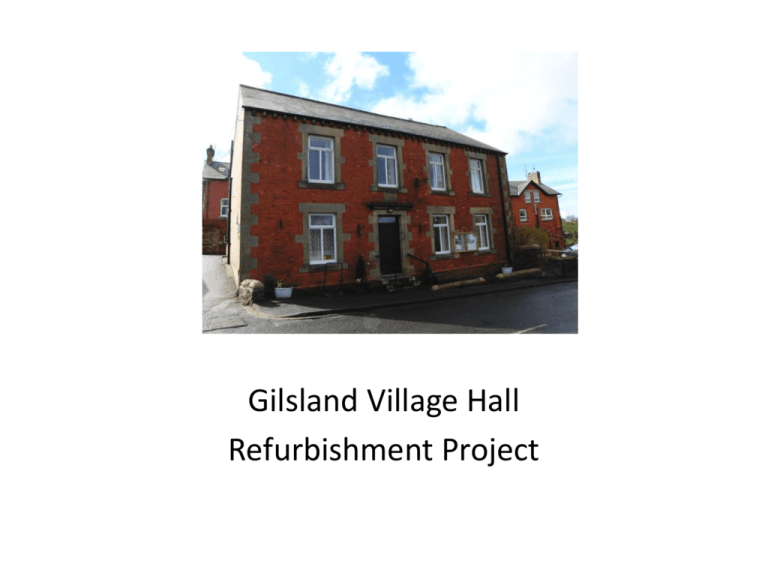Gilsland-presentation - The West Northumberland Community
advertisement

Gilsland Village Hall Refurbishment Project • Built in 1893 as a reading room for the village • Large function room upstairs and smaller hall, kitchen and toilets downstairs • Used as a venue for some village events but not used to its full potential • Very cold • Very expensive to heat • Not very welcoming • Often people would sit through an event without taking their hats and coats off!! Wall mounted electric heaters Very well used electricity coin meter! Upstairs Hall before its refurbishment Old style wall heaters No insulation in the roof • Loss of Village Post Office – outreach service in village hall 3 times a week • Loss of Village Shop • Village Hall became more important for facilities, services and social inclusion • Some improvements had taken place, including double glazing, improvements to kitchen • Becoming obvious that some major refurbishment was needed • Change of committee • New committee realised importance of developing the hall and making it more welcoming • Poor thermal efficiency and inadequate heating arrangements Working with Community Action Northumberland • Village Hall Health Check • Village Hall Energy Audit – Identified poor insulation (none) – Identified increased cost of electricity – more than doubled between 2008 and 2009 and likely to get worse Working with Northumberland National Park Authority • Needed to look at the feasibility of a programme of improvements • Funding from NNPA enabled us to commission a renewable energy options appraisal • Appointed architect and structural engineer Proposed Energy Efficiency Measures • Recommended by project architect:• Sheep’s wool insulation in the roof void • Window reveals in large upstairs hall and smaller downstairs hall to be lined internally with high performance insulated plasterboard • External walls of both halls to be lined internally with high performance insulated plasterboard • Sloping portion of roof to be insulated with rigid foam and high performance insulated plasterboard • New entrance lobby to be formed • Would involve other building work – electrical, re-plastering, internal decoration, new heating distribution system • Calculated heat loss reduction of 70% Options for Renewable Energies • Solar photo voltaics – 3kw system over the rear load bearing wall should generate around 2,344 kWh per annum with a cost benefit of around £1,200 through Feed In Tariff • Clean Energy Cash Back would be a significant new income stream for the hall • Air Source Heat Pump and Distribution System - remove electric wall heaters (using 37Kw) replace with single heat pump using 5.2Kw and modern distribution system How an Air Source Heat Pump works • Air source heat pumps absorb heat from the outside air, in the same way that a fridge extracts heat from its inside. • It can get heat from the air even when the temperature is as low as -15° C. • Heat pumps have some impact on the environment as they need electricity to run, but the heat they extract from the air is constantly being renewed naturally. • Heat from the air is absorbed at low temperature into a fluid. This fluid then passes through a compressor where its temperature is increased, and transfers its higher temperature heat to the heating circuits of the hall. FUNDING !!! • Business Plan – Background – SWOT analysis – Project Proposal – Environmental Benefits – Social and Economic Benefits – Funding Strategy – Cash Flow – Support from the Community • Two Phase approach – Thermal measures, building costs etc. total £39,000 • Renewable Energies – Solar PV panels, Air Source Heat Pump, Distribution System total £31,000 • Project Management by Natural Regeneration Consultancy included • Enabled us to target different funders for different parts of the project • Phase One – Northumberland Uplands LEADER Programme – funding thermal measures - £18,500 • Phase two – Community Sustainable Energy Programme (CSEP) – renewable energies £12,500 • Total cost of £69,000 at this stage • Identified additional major structural work required to roof costing £14,000 • Total funding required – approx. £83,000 • Made applications to 27 organisations • Many different application processes • Business plan, presentations, second applications, additional information, visits • Supported by 18 organisations to obtain funding for the complete project • Supported with money and help in kind • Local fundraising / help in kind The work begins! The roof comes down with 120 years of dirt! New Structural Work Kingspan to create the walls Sheep's Wool Insulation All electrics to be moved Worked around the Post Office Post Office carried on as normal Walls take shape Helpers from Carillion Our new main hall Helpers from the village Non-slip staircase Team from Carillion came to tea Solar PV Panels were installed Air source heat pump was installed A new sign! Other improvements too Official opening by the Duchess of Northumberland Benefits for Gilsland • • • • Warm, friendly venue for any village event Economically viable Lowered our carbon footprint More groups using the hall, therefore more services and activities available locally • More income for the hall without increasing charges • Secured the venue as the hub of the village for the future Increased use of hall • Previous groups – craft, WI, Whist Drive, Dominoes, occasional sport activities, PO, Gardening Club • New groups – Youth Club, church, village coffee mornings, Rusty painters, Foot Clinic, Clog Dancers, Beauty and Nail session, Jewellery Valuer, Girl Guide weekend, outside organisations for meetings and training (LEADER, Wildlife Trust, WNBC), Fibre and Spinning Group, Birthday parties, Tea Dances, Gilsland Station, Gilsland Show, Exhibitions and Events, Summer Teas, Craft Fairs and more enquires • A real centre for activities in the village and surrounding area No More Hats and Coats!!






